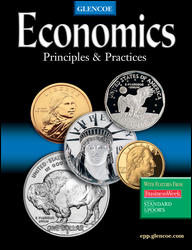
Economics Principles & PracticesChapter 20: Global Economic ChallengesChapter OverviewsChapter 20 deals with the global economic challenges that stem from the growing demand for scarce resources and the incentives that affect their use. Population growth is the major factor putting pressure on the use of scarce resources, and economic incentives can be used to help conserve them. Section 1 examines the global demand for resources in light of world population growth. Thomas Malthus, writing in 1798, was the first economist to raise the specter of the world's population being driven to a subsistence level as a result of population growing faster than the resources able to support it. Malthus may not have foreseen the enormous advances in technology that have benefited the industrialized nations, but for many parts of the world, his predictions are a stark reality. One of the consequences of population growth is the rapid depletion of nonrenewable energy. The 1970s oil embargo raised interest in alternative energy sources such as solar power, hydroelectric power, wind power, nuclear energy, and other fuels. Section 2 explores the role that prices play to preserve resources. As resources become scarce, their prices rise, causing people to use them more carefully. The incentives provided by the price system are one of the most effective forces in the economy today. Concern for renewable energy resources peaked after the oil embargo, but the lower price of oil since then has reduced interest in these alternative energy sources. The problem of pollution can also be controlled with legislated standards, or by using the incentives supplied by the price system. Pollution taxes and pollution permits are currently being used to complement legislated standards. These approaches are more flexible in that they give firms the opportunity to reduce pollution on their own. This happens when firms must pay taxes or obtain permits that allow them to emit pollution as a byproduct of their activities. Government can encourage firms to reduce their pollution by raising the tax, or by reducing the number of pollution permits, which raises their cost. Section 3 examines the way that economics serves as a generalized framework for decision making. Economics offers the tools of analysis and methodologies to help people cope with the future. The concepts of opportunity cost and cost-benefit analysis are key components of the process. Capitalism has emerged as the dominant type of economic organization in the world today. As a result, markets and the forces of supply and demand are more important than ever as they work to establish the prices that serve as signals to both producers and consumers. Markets also have the flexibility to cope with changes and unknown events that are likely to occur in the future. |  |















